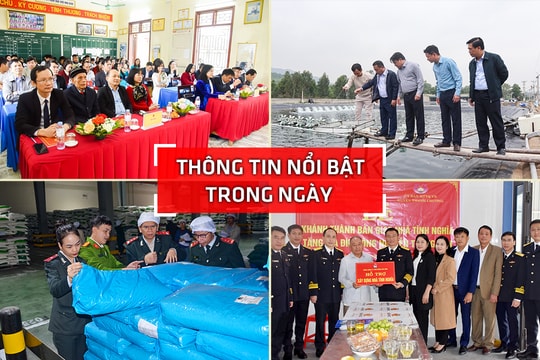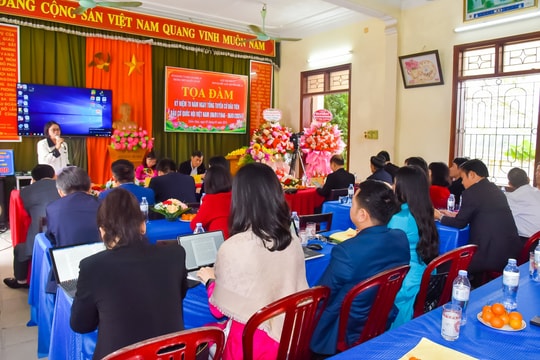The first General Election Day: Forever in the national memory
(Baonghean.vn) - From the General Election on January 6, 1946, the National Assembly - the highest authority of the Democratic Republic of Vietnam was born, marking a leap forward in democratic institutions.
For the first time in the thousands of years of history of the newly reborn country, “anyone who wants to take care of national affairs has the right to run for election, and any citizen has the right to vote. Regardless of gender, rich or poor, religion, race, class, or political party, any Vietnamese citizen has these two rights.”(*)
Choosing virtuous and talented people to take on national affairs
On the morning of September 3, 1945, the Ministers of the Provisional Government of the Democratic Republic of Vietnam attended the first meeting at the Northern Government (formerly the Governor's Palace of Tonkin). Chairing the historic meeting, President Ho Chi Minh outlined six urgent tasks of the Vietnamese Revolution immediately after Independence Day, including the request that the Government soon organize a General Election with universal suffrage for the People. The Ministers discussed enthusiastically and completely agreed with his proposals.
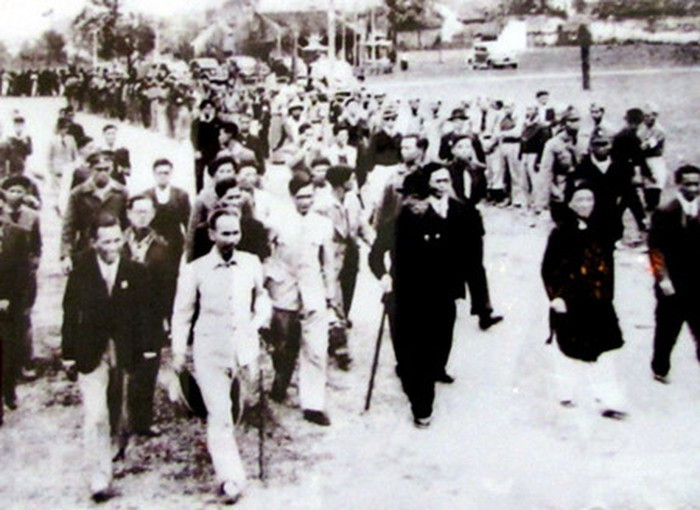 |
| Hanoi people welcome President Ho Chi Minh and candidates nominated for the 1st National Assembly. Photo: Document |
Only 5 days later, Minister of the Interior Vo Nguyen Giap, on behalf of the President of the Government, signed Decree No. 14-SL dated September 8, 1945, on the opening of the General Election nationwide. Initially, the time for the General Election nationwide was set for December 23, 1945. However, close to the election day, due to difficult conditions, more time was needed for preparation, the Government issued a Decree allowing the postponement of the General Election until Sunday, January 6, 1946.
General Electiontook place in extremely harsh and dangerous conditions when simultaneously having to confront many reactionary forces at home and abroad; they tried to sabotage right from the start with many blatant tricks. In the South and South Central regions, the French colonialists returned to invade our country, and tried to conduct many sweeps, searches, raids, and massacres during the days leading up to the election and on election day itself. But the enemy's sabotage could not prevent voters from exercising their rights as citizens of an independent country. Despite the diversity in composition, origin, and social class, the vast majority of voters were determined to hold their own ballots to elect virtuous and talented people to take on the country's affairs.
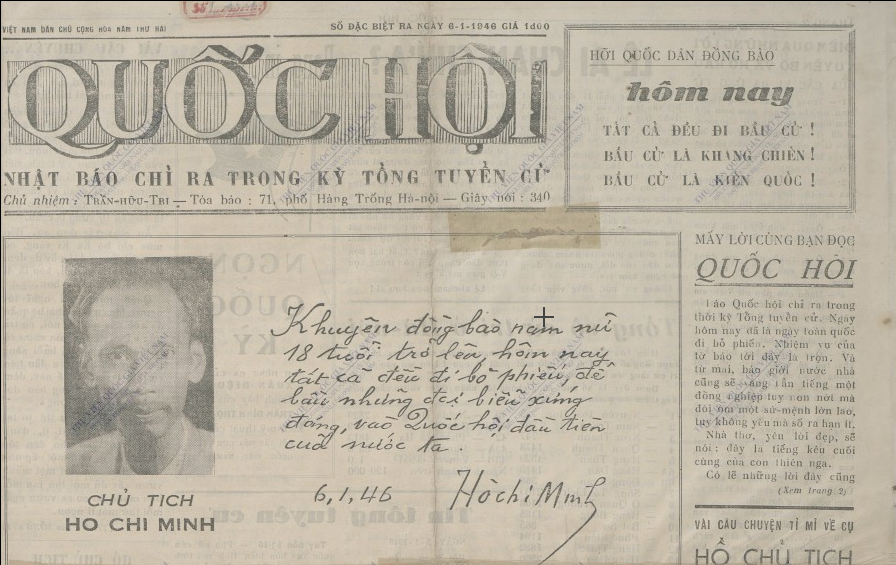 |
| Special issue of the National Assembly Newspaper published on General Election Day. |
The book “First National Assembly (1946): Stories of Election Day” also recorded that the National Assembly Newspaper at that time reprinted the news about an 85-year-old woman in Quang Tri who persevered in lighting a lamp to learn Quoc Ngu so that on election day she could write the name of her chosen candidate on the ballot. Or in Nghe An, an old woman, when holding the ballot in her hand on election day, was moved: “In my life, I have been a servant for more than 60 years, I never expected that one day I would know how to write on a piece of paper to choose talented and virtuous people. I can die with my eyes closed.” In some places in the South Central region, the General Election took place under the enemy's bombs and bullets, guerrilla fighters held guns in one hand and ballots in the other...
Over 97% of Nghe An voters went to the polls
Along with the whole country, at that time in Nghe An, preparations for the first General Election were extremely urgent. Weeks before the election, the list of voters was publicly posted, and the list of candidates was also widely announced to the masses. In addition to those introduced by the Viet Minh Front, there were also a number of alliances and independent candidates. At that time, the entire Nghe An province elected 12 representatives, with Vinh town alone, an independent constituency with Nghe An, electing 2 representatives.
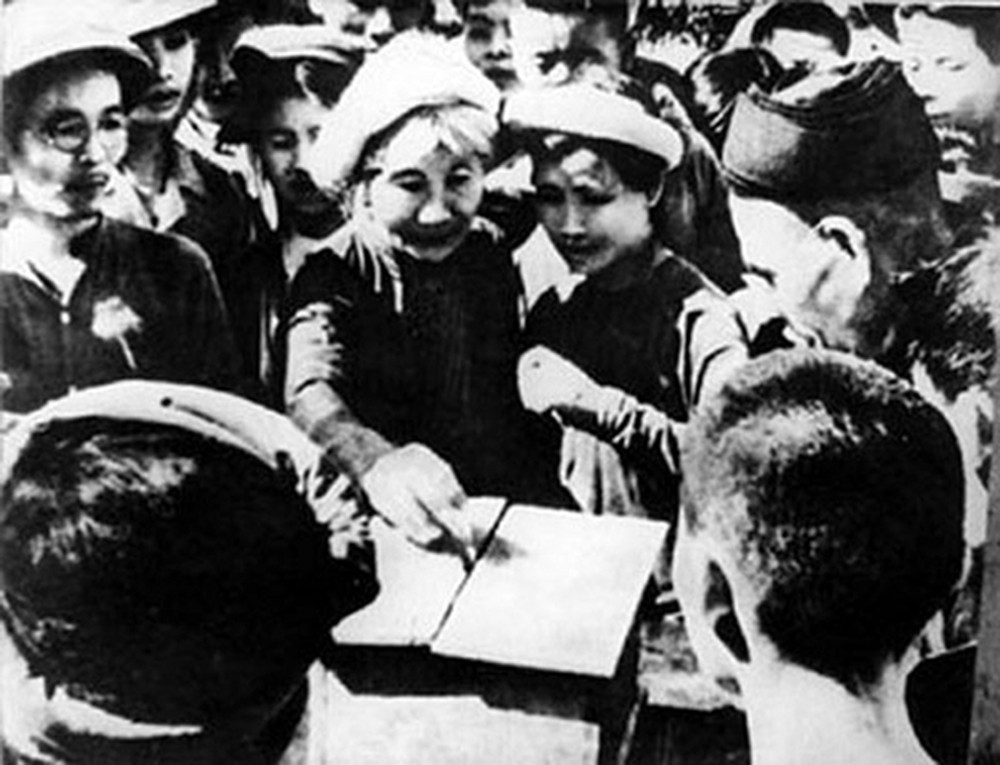 |
| Voters in the suburbs of Hanoi cast their ballots to elect deputies to the 1st National Assembly, January 6, 1946. Photo: Archive |
The history of the Vinh City Party Committee also recounts: On January 6, 1946, the entire population enthusiastically went to vote. At many polling stations in the town, people participated in large numbers, even the elderly and sick whose children could not help them to the polling place had people bring ballot boxes to their homes so they could exercise their voting rights. The results in Vinh town were that candidate Tran Van Cung, a delegate introduced by the Viet Minh Front, and candidate Nguyen Tao, Chief of Nghe An Police Department, were elected.
Throughout Nghe An province, the Provincial Party Committee, together with authorities at all levels and organizations, mobilized the masses to participate in the General Election. “It was truly a great festival. Everywhere, flags were flying, drums were fluttering, and slogans were hung in crowded places. Over 97% of the total number of voters in the whole province eagerly went to vote,” wrote the History of Nghe An Provincial Party Committee, volume 1 (1930 - 1954) of the National Political Publishing House. Ms. Ton Thi Que, from Vo Liet village, Thanh Chuong district, was the first female National Assembly delegate of Nghe An and one of the first 10 female National Assembly delegates in the whole country. In our province, after the National Assembly election, there was another important historical milestone, the first election of People's Councils at all levels - February 24, 1946. At that time, voters in the province elected 39 delegates representing the people to the Provincial People's Council. On March 23, 1946, the Provincial People's Council held its first session to elect the Provincial Administrative Committee with Mr. Le Viet Luong as Chairman.
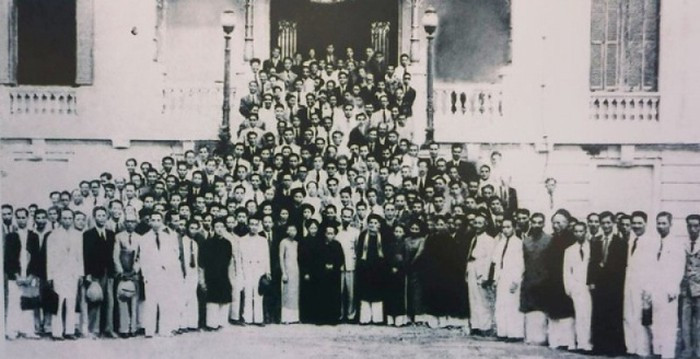 |
| After the General Election, the people elected 333 National Assembly deputies, of which the North had 152, the Central 108 and the South 73. There were 10 female deputies. Photo: Document |
75 years have passed, but the first National Assembly election day on January 6, 1946 - the day that opened the history of the constitutional establishment of an independent and free Vietnam - remains forever etched in the nation's memory. Speaking about the great significance of the first General Election, in his opening speech at the first session of the first National Assembly, President Ho Chi Minh concluded: "... The General Election is the result of the sacrifices and struggles of our ancestors, it is the result of the heroic solidarity and struggle of all our Vietnamese compatriots, the solidarity of compatriots regardless of age, big or small, including all religions, all ethnic groups on the territory of Vietnam, closely united into a bloc of sacrifice, fearless of danger, fighting for independence for the Fatherland".
------------------------------------------------
(*) Excerpt from the article "The Meaning of the General Election" by Uncle Ho published in the newspaper Cuu Quoc No. 130 on December 31, 1945

